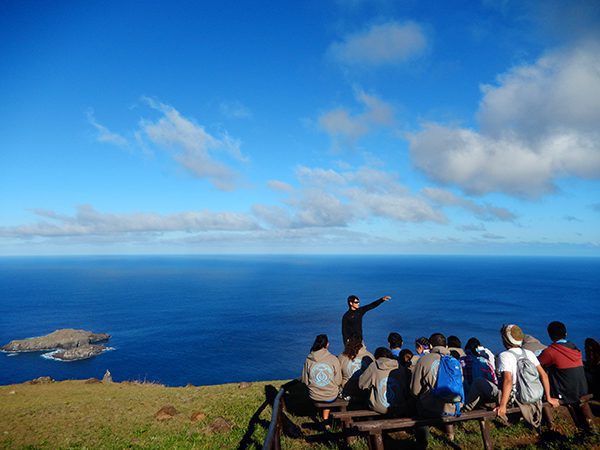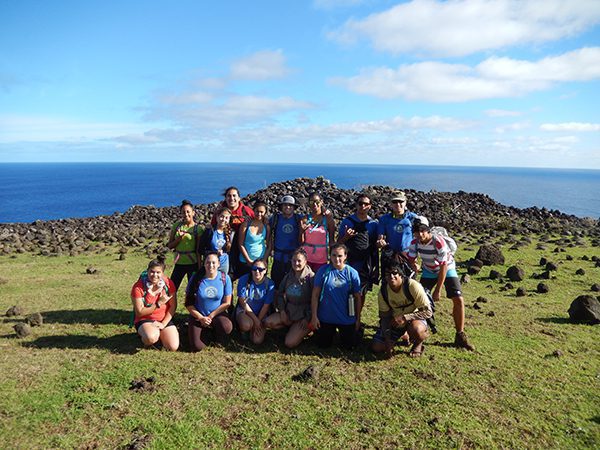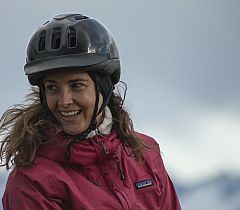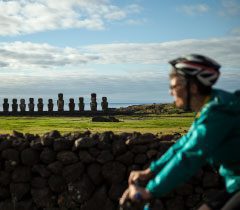The Terevaka Archaeological Outreach
An annual two-week workshop that engages local high school students in cultural awareness and sustainable techniques for archaeologial survey.

Explora was founded more than 20 years ago on the wish to explore some of the most remote places in South America. The places where the company operates are not only far from the urban centers on the continent, but also hide some of the most important cultural riches of the planet.
Along with minimizing the impact of its operations, an important part of explora’s Sustainability Program consists of working with the communities living in the places to which it introduces its travelers. In this context, one of the most successful projects in recent years has been the Terevaka Archaeological Outreach Program (TAO), developed together with the American archaeologist Brett Shepardson.
In the information age, we often don’t realize the power of change that an investigation can have when the results fall into the right hands. The urgency for the Rapa Nui to develop educational systems that would give their youth the tools to enrich their unique local knowledge was the motivation for creating this program. While Rapa Nui is no stranger to archaeologists and anthropologists, in the past the knowledge generated as a result of the research has not remained on the island or been transmitted to the local people, but has become international academic study material. Without detracting from the above, Brett Shepardson knew that combining local knowledge of Rapa Nui with new technologies and research methods could generate a substantial increase in the involvement of locals in their own culture. In his words, “those who carry and spread the information should be the Rapa Nui themselves”.

The program consists of a 14-day educational workshop for young Rapa Nui over 16 years old, held every year during the winter holidays. TAO defines its mission in three parts: first, it offers an educational experience involving the natural and cultural resources in which the local community is immersed; secondly, it generates awareness and experience regarding conservation and sustainable development, and finally, it studies and documents the past and present natural and cultural phenomena on the island. Every June for the past 12 years he has dropped his job as an archaeologist at Northern Arizona University (NAU) to return to Rapa Nui and deliver the program.
The student and support team’s base camp is set up on the hotel grounds; transportation and explorations for the workshop field trips, as well as food, are provided for everyone involved.
This year has been particularly successful in terms of what all parties have achieved as a team, and in the consolidation of the program in professional terms as well as in local recognition. For the first time in 12 years support was given by the international academic community, specifically that of the American universities Northern Arizona University and Mount Holyoke, which sent 4 students majoring in anthropology and engineering to participate in the organization of TAO as part of their curriculum. Using these student’s knowledge, and responding to the needs of the island, a new renewable energy workshop was added to the existing archeology workshop, its aim was to teach students the operation and construction of various homemade generators. Similarly, in terms of call, 2015 was the first year in which the applications exceeded the available seats; therefore the organizing committee proceeded to make a selection of pupils based on application letters, gender equality and commitment.
Gonzalo Droppelmann, explora’s Sustainability Manager, stated that this is just the beginning of the collaborative instances that the Chilean company will be in support of: “We believe in the potential that our hotel operating assets have for other projects like Brett’s, which seek to enrich and preserve the tangible and intangible heritage of the remote places where we operate. We hope that collaborative works like TAO become common place not only at explora but throughout the hotel industry. ”

